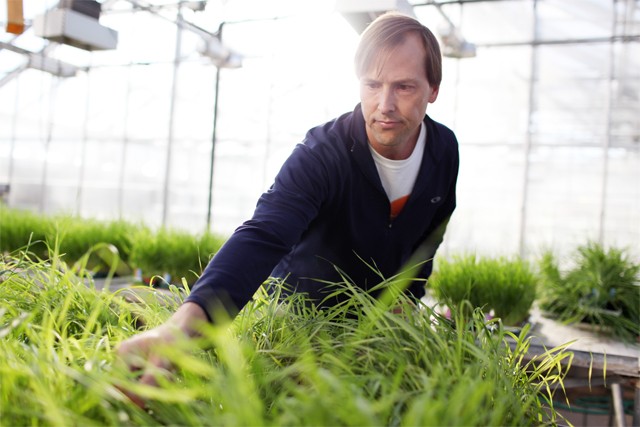Few can claim that their work affects millions of lives. For researchers at the Cereal Disease Laboratory, that figure might be an underestimate.
CDL Director Martin Carson and his colleagues are the foremost experts in the world on a wheat-killing disease that is threatening to take out a significant portion of the worldâÄôs wheat crop.
The culprit is Ug99, a strain of fungus called stem rust. It severely damages and often kills the entire plant.
CDL is located on the University of MinnesotaâÄôs St. Paul campus, but the CDL is actually a part of the United States Department of Agriculture, not the University.
Ug99 is an airborne disease, which gives it the potential to spread quickly. Within 10 days of landing on the plant, a pod erupts on the surface of the stem and releases âÄúliterally thousands of sporesâÄù into the air, Carson said.
Once it attaches itself to the stem, Ug99 burrows inside of it.
âÄúWhat happens is that [the disease] sends in parts of the fungus into the plantâÄôs stem, and so nutrients being transported through the stem âÄî like water or sugar âÄî get used up by the fungus instead of the plant,âÄù said Matt Rouse, a University masterâÄôs student working on the problem at the CDL.
CDL is working on the solution: a more resistant strain of wheat that will be able to resist Ug99 in the future.
âÄúWe try to stay ahead of the fungus, thatâÄôs what weâÄôve been successful at,âÄù Carson said. âÄúOur strategy is to try and get more than one effective gene into these new wheats.âÄù
Another major episode of stem rust in the United States occurred in the 1950s.
âÄúWe know from experience from the âÄô50s epidemic that it has the potential to be devastating. Like 40 percent of the wheat crop in North Dakota was lost,âÄù Carson said. The disease has mutated at least twice since then.
Ug99 was first discovered in Uganda in 1998, but itâÄôs moving, Ronnie Coffman, vice chairman of the Borlaug Global Rust Initiative, said.
âÄúItâÄôs as far north as Iran and as far south as South Africa and it will keep moving,âÄù Coffman said. âÄúIf conditions are right it will grow into an epidemic and become an unpredictable disaster.âÄù
Melissa Kessler, spokeswoman for the National Association of Wheat Growers, said Uganda has seen the greatest impact by Ug99. Other countries in the Middle East have been affected as well.
Researchers at the CDL said Ug99 is a problem in Africa, Asia and the Middle East at the moment, where wheat growers are a year or two behind combating stem-rust diseases.
Experts agreed it is highly unlikely that a resistant strain will not be introduced, and the wheat crop lost, because if researchers fail, the result could be catastrophic.
âÄúIt could be devastating,âÄù Carson said, âÄúIn many countries [wheat] represents most of the caloric intake.âÄù
If nothing else, the persistence of Ug99 would cause a very sharp spike in food prices, which could be devastating in countries with unstable governments, Carson said, adding that if a resistant strain isnâÄôt introduced, there could be food riots like those that seized several countries in 2008.
Experts at the NWGA agreed.
âÄúThe potential damage is incalculable,âÄù Jane DeMarchi, director of government affairs for research and technology with the NWGA, said.
Coffman is sure a solution is in the near future.
âÄúThere is no chance that a resistance will not be found,âÄù Coffman said. âÄúWe hope we now have the technology to develop durable resistances.âÄù
Carson and Rouse said they both feel a major responsibility to tackle the problem.
âÄúWe are the epicenter of research in the United States,âÄù Carson said. âÄúWe have more people working on cereal rust diseases than anywhere else in the world. Some of the most ground-breaking work on stem rust has been done here.âÄù
âÄúThe big question now is, âÄòCan we get resistant varieties in Pakistan in order to prevent an epidemic?âÄôâÄù Carson said.
Experts across the nation agreed.
âÄúIt is important to emphasize how important the UniversityâÄôs activities are for the whole world,âÄù DeMarchi said. âÄúThe whole world is very reliant right now on the CDL.âÄù









